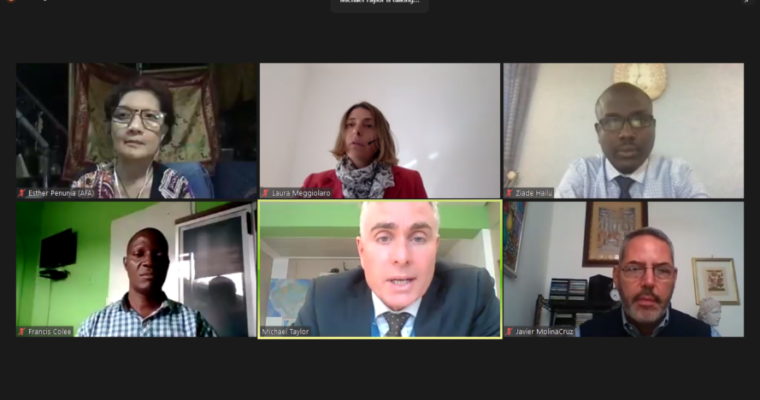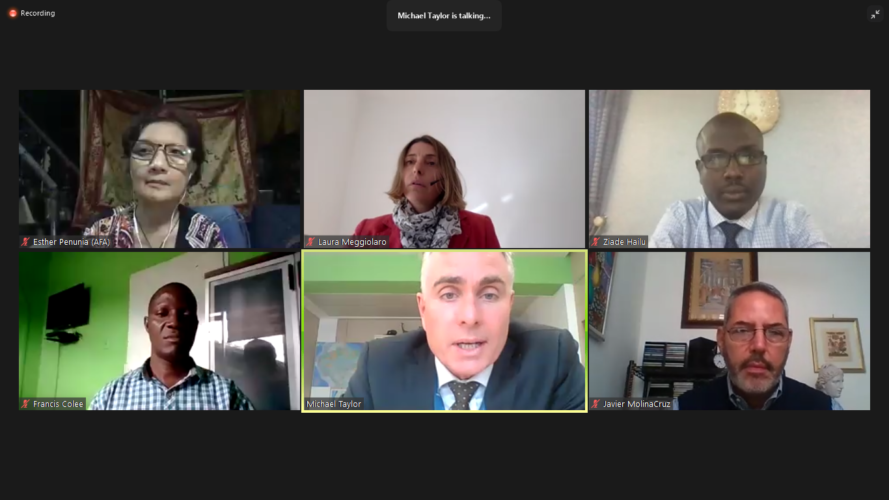This article was originally published by the ComDev Asia
On the first day of the Committee on World Food Security (CFS) High-Level Special Event on Strengthening Global Governance of Food Security and Nutrition last October 13, 2020, their Partners Event titled “Building Back Better: Confronting the Impact of COVID-19 on Land Tenure, Food Security and Nutrition” invited panelists from different sectors to provide varying perspectives on land rights and food systems. One of the panelists for this Partners Event was Ms. Esther Penunia, Secretary General of the Asian Farmers’ Association for Sustainable Rural Development (AFA), who served as a representative for Asian small-scale farmers.
When asked about the immediate effects of COVID-19 on small-scale farmers, AFA identified six key effects of the pandemic:
- Increased displacement of landless farmers and indigenous communities.
- Additional pressures for land use.
- Suspension or halt of agrarian reform services by the government and CSOs.
- Prevention of pastoralists from going to or returning back from summer pastures.
- “Giving of license” to private companies and industries to come to the territories of local Indigenous Peoples.
- Land rights defenders and activists were threatened, arrested, or killed.
These key effects were identified in one of the events in the Asia Land Forum which was a workshop on Sustaining Family Farming in Asia-Pacific. The said workshop was convened by International Land Coalition (ILC), People’s Campaign for Agrarian Reform Network (AR Now!), AFA, Stockholm Environment Institute (SEI), and International Fund for Agricultural Development (IFAD).
When asked about the opportunity of farmers to build back better in terms of land rights, AFA sees land rights as a basic need for small-scale farmers. Ms. Penunia added that government institutions should secure farmers’ land rights and work on incentivizing sustainable agriculture and other sustainable practices as a means of supporting small-scale farmers.
In order to make the Voluntary Guidelines on the Governance of Tenure of Land, Waters, Fisheries, and Forests (VGGT) more impactful at the country level, AFA suggests the decentralization and regionalization of CFS processes and the support of CSOs in organizing people and educating them on their rights. Through the education of farmers on their rights, they are equipped with the ability to negotiate with the government and landowners.
Lastly, AFA affirms that the secured land rights of small-scale family farmers are fundamental in achieving sustainable and equitable food systems. A multi-stakeholder approach should be used and have farmers, indigenous peoples, and pastoralists take the lead. Additionally, the support and political will of governments and international partners serve as a key factor in this approach.
Also part of the panel were Francis Colee (Head of Programs, Green Advocates), Javier Molina Cruz (Senior Land Tenure Officer, Food and Agriculture Organization of the United Nations (FAO)), and Laura Meggiolaro (Team Leader, Land Portal Foundation).
Mr. Colee shared his insights on the struggle of farmers in Liberia and how it resonates with farmers in Asia. He shares the policy grabbing that is currently happening where the government is favoring oil palm companies, thus affecting the land rights of the communities in Liberia. Their government is pushing for national consultations without the free, prior, and informed consent of the communities whose ancestral lands and areas are targeted for oil palm cultivation. He also shares the need for communities to be involved in the decision-making process of the government adding that consent should be obtained from the communities when it comes to making decisions that will ultimately affect their future. He also advocates the investment in educational campaigns on VGGT and its environmental relevance.
Mr. Cruz talked about the state of peoples’ land tenure during the pandemic and highlighted the need to secure and regularize tenure rights of vulnerable groups in an inexpensive and participatory manner. He also identified the use of multi-stakeholder platforms to engage and create consensus with different sectors on how to build back better.
On the topic of access to data and other land-related information, Ms. Meggiolaro shared that there are still difficulties in terms of data sharing. She emphasized a need for more institutional coordination and transparency with regards to data and other information so that it can be accessible and useable for different stakeholders. She adds that better data governance could also lead to improved government services. (ComDev Asia, 19 October 2020)





Comments are closed